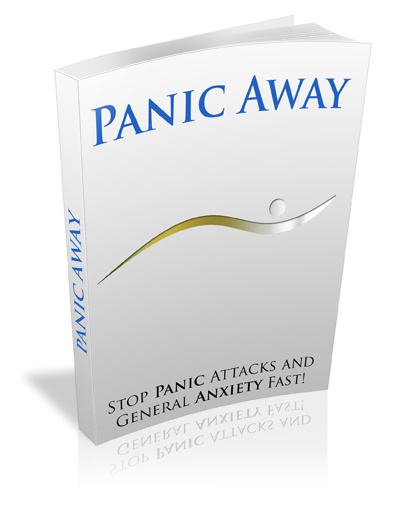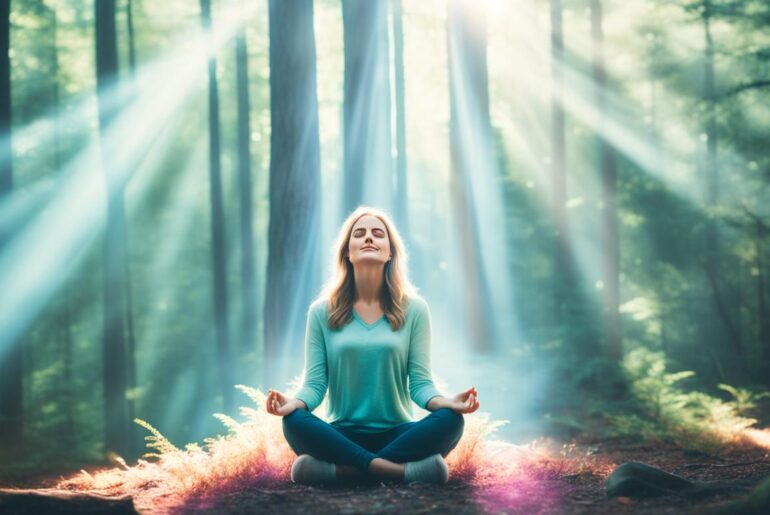Have you ever felt the weight of anxiety bearing down on your shoulders? The racing thoughts, the tightening in your chest, the constant feeling of unease? I know exactly how you feel. My name is Emily, and I've struggled with anxiety for as long as I can remember.
For years, it felt like a never-ending cycle of worry and fear. I tried everything to find relief – therapy, medication, even avoiding triggers altogether. But it wasn't until I discovered meditation that I finally found a sense of calm and peace within myself.
Our Top Pick For Beating Panic Attacks

Stopping, and preventing, panic attacks is now even easier.
Meditation has been a true game-changer in my life. It's a simple practice that can be done anywhere, anytime, and it doesn't require any special equipment. But the impact it has had on my mental health and overall well-being is profound.
In this article, I'll share with you 10 steps to meditate your way to anxiety relief. These steps have helped me and countless others find inner peace and manage the symptoms of anxiety. So if you're ready to embark on a journey of self-discovery and healing, let's dive in!
Key Takeaways:
- Meditation is a simple and fast way to reduce anxiety and find inner peace.
- It can be practiced anywhere, anytime, and doesn't require any special equipment.
- Meditation has numerous benefits, including calming the mind, improving emotional well-being, and helping to manage symptoms of anxiety.
- There are different types of meditation, such as guided meditation, mindfulness meditation, and yoga, each with its own unique techniques and benefits.
- To get started with meditation, find a quiet and comfortable place, focus on your breath, and gradually increase the duration of your practice.
The Benefits of Meditation for Anxiety Relief
Meditation offers a wide range of benefits for anxiety relief, promoting a sense of calm, inner peace, and emotional well-being. By incorporating mindfulness techniques, meditation can effectively alleviate symptoms of anxiety and provide a holistic approach to managing stress.
One of the key benefits of meditation is its ability to help individuals stay centered and maintain inner peace throughout the day. By cultivating a regular meditation practice, you can develop a greater sense of awareness and mindfulness, enabling you to navigate stressful situations with more ease and resilience.
Meditation also has a positive impact on emotional well-being. It helps reduce negative feelings such as worry, fear, and overwhelm, allowing you to experience a greater sense of tranquility and contentment. Through mindfulness techniques, meditation encourages you to focus on the present moment, promoting a shift in attention away from anxious thoughts and towards a more peaceful state of mind.
Moreover, meditation can enhance various aspects of your life, including creativity, patience, and sleep quality. By calming the mind and redirecting thoughts, meditation fosters a state of relaxation and openness, which can ignite creativity and expand your perspective. Additionally, regular meditation practice can improve sleep patterns, leading to better quality sleep and increased well-being.
Research suggests that meditation may also have a positive impact on managing symptoms of medical conditions such as anxiety, asthma, cancer, chronic pain, depression, heart disease, high blood pressure, irritable bowel syndrome, sleep problems, and tension headaches.
Expert Quote
“Meditation can be a powerful tool for managing anxiety. By cultivating mindfulness and focusing on the present moment, individuals can experience a greater sense of calm and emotional well-being.” – Dr. Sarah Johnson, Meditation Expert
It's important to note that while meditation can be beneficial for anxiety relief, it is essential to consult with a healthcare professional before using it as a treatment for any health condition. They can provide personalized guidance and ensure that meditation aligns with your specific needs and circumstances.
Incorporating meditation into your daily routine can help you manage anxiety and find peace within yourself. By embracing the benefits of meditation and practicing mindfulness techniques, you can cultivate a calm, centered, and balanced mindset, promoting emotional well-being and overall harmony in your life.
Different Types of Meditation
When it comes to finding anxiety relief, there are various types of meditation that you can explore. Each type offers its own unique techniques and benefits, allowing you to find the approach that resonates best with you.
Guided Meditation
Guided meditation involves forming mental images of calming places or things to help relax. By listening to a recorded voice or following along with a meditation app, you can immerse yourself in a visualized setting that promotes relaxation and peace.
Mantra Meditation
Mantra meditation focuses on repeating a calming word, thought, or phrase. By consistently bringing your attention back to the mantra, you establish a soothing rhythm that allows you to let go of racing thoughts and find inner stillness.
Mindfulness Meditation
Mindfulness meditation is all about being present and aware of the current moment, including your thoughts and feelings, without judgment. By practicing non-reactivity and acceptance, you cultivate a sense of calm and develop a deeper understanding of yourself.
Qigong
Qigong combines meditation, relaxation, movement, and breathing exercises to restore and maintain balance in both the mind and body. This ancient Chinese practice is known for its gentle flowing movements and focuses on harmonizing the flow of energy within the body.
Tai Chi
Tai chi is a form of gentle martial arts training that incorporates slow and graceful movements, deep breathing, and mindfulness. By synchronizing movement with breath, you cultivate a state of mental tranquility and physical balance.
Yoga
Yoga combines physical postures with controlled breathing to promote flexibility, strength, and a calm mind. The combination of movement and mindfulness in yoga helps release tension and create space for relaxation and peace.
“The different types of meditation offer a variety of techniques to explore and find the one that resonates best with you. Whether it's guided meditation to visualize a calming place, mantra repetition to establish a soothing rhythm, or mindfulness to cultivate presence, there's a type of meditation for everyone.”
Basic Meditations for Anxiety Relief
When it comes to finding relief from anxiety, practicing basic meditations can be highly effective. Incorporating these simple techniques into your daily routine can help calm your mind, reduce stress, and promote relaxation. Here are some basic meditations that you can try:
1. Deep Breathing Exercises
Deep breathing exercises involve taking slow, deep breaths to restore regular breathing patterns and reduce anxiety symptoms. By focusing on your breath and consciously inhaling and exhaling, you can bring a sense of calm to your body and mind.
2. Body Scanning
Body scanning is a meditation technique that involves bringing attention to each part of your body and becoming aware of how it feels. This practice helps release tension and promotes deep relaxation. Start from the top of your head and slowly move your attention down to your toes, noticing any sensations or areas of tension along the way.
3. Repeated Mantras
Repeating a calming mantra can help quiet the mind and promote a sense of peace and tranquility. Choose a word, phrase, or affirmation that resonates with you and repeat it silently or out loud during your meditation practice. This can help redirect your thoughts and cultivate a positive mindset.
4. Walking Meditation
Walking meditation is a practice that involves slowing down and focusing on each movement of your legs and feet while walking. By being fully present in the act of walking, you can promote relaxation, mindfulness, and a deeper connection with your body and surroundings.
5. Prayer
Prayer is a well-known form of meditation that involves connecting with a higher power and seeking guidance and support. Whether you follow a specific religious tradition or have your own spiritual beliefs, prayer can provide comfort, solace, and a sense of peace.
6. Reading and Reflection
Engaging in reading and reflecting on sacred texts, inspirational literature, or even calming poetry can help promote relaxation and mindfulness. Take time to read passages that resonate with you and reflect on their meaning. This practice can bring clarity, inspiration, and a sense of inner peace.
By incorporating these basic meditations into your daily routine, you can develop a powerful toolkit for anxiety relief. Experiment with different techniques and find the ones that work best for you. Remember, consistency and regular practice are key to experiencing the full benefits of meditation.

| Meditation Technique | Description |
|---|---|
| Deep Breathing Exercises | Involves taking slow, deep breaths to restore regular breathing patterns and reduce anxiety symptoms. |
| Body Scanning | Brings attention to each part of the body, promoting relaxation and releasing tension. |
| Repeated Mantras | Repeating a calming word, phrase, or affirmation to quiet the mind and cultivate peace. |
| Walking Meditation | Slowing down and focusing on each movement of the legs and feet while walking to promote relaxation and mindfulness. |
| Prayer | Connecting with a higher power and seeking guidance and support. |
| Reading and Reflection | Engaging in reading sacred texts or calming literature to promote relaxation and mindfulness. |
Building Meditation Skills for Long-Term Anxiety Relief
Building meditation skills is crucial for achieving long-term relief from anxiety. It requires consistent practice and a strong commitment to incorporate meditation into your daily routine. One type of meditation that can be particularly helpful is mindfulness meditation.
Mindfulness meditation allows you to develop awareness and attention, which can enhance concentration and improve willpower. By committing to meditate every day, even if it's just for a few minutes, you can gradually increase the duration of your practice as you become more comfortable.
It's important to understand that meditation is not about completely clearing your mind. Instead, it's about recognizing when your mind wanders and gently bringing your attention back to your chosen focus, such as your breath or a specific mantra. This process helps develop your ability to stay present and focused, even in the face of anxious thoughts and feelings.
Meditation is a powerful tool that can bring long-lasting benefits to your life. By building your meditation skills, you can increase your resilience and lower your overall stress levels, ultimately finding a greater sense of peace and calm.
Benefits of Building Meditation Skills for Anxiety Relief
“Through consistent meditation practice, I have experienced profound improvements in my ability to manage anxiety. It has helped me cultivate a greater sense of awareness, allowing me to recognize and address anxious thoughts and feelings more effectively.”
| Benefits of Building Meditation Skills for Anxiety Relief | Explanation |
|---|---|
| Increased resilience | Meditation helps develop mental and emotional resilience, allowing you to better cope with and bounce back from anxiety-inducing situations. |
| Reduced stress levels | Regular meditation practice can significantly reduce overall stress levels, promoting a greater sense of calm and well-being. |
| Improved focus and concentration | By training your mind to stay present and focused during meditation, you can enhance your ability to concentrate and sustain attention in everyday life. |
| Enhanced self-awareness | Meditation cultivates self-awareness, allowing you to become more attuned to your thoughts, emotions, and bodily sensations, providing insight into the root causes of anxiety. |
| Greater sense of inner peace and calm | Consistent meditation practice fosters a state of inner peace and calm, enabling you to navigate life's challenges with a greater sense of equanimity. |
Through dedication and a willingness to practice regularly, you can strengthen your meditation skills and experience long-term relief from anxiety. Make a commitment to yourself and prioritize your well-being by incorporating meditation into your daily routine. Start with just a few minutes a day and gradually increase the duration as you gain comfort and familiarity with the practice. With time and practice, you'll develop a valuable tool for managing anxiety and finding peace within yourself.
Staying Active to Reduce Anxiety Symptoms
Staying physically active can have a significant impact on reducing anxiety symptoms. Research suggests that individuals who maintain an active lifestyle have a lower likelihood of developing anxiety symptoms. Engaging in physical exercise not only helps divert attention from anxious thoughts but also triggers changes in brain chemistry that contribute to anxiety relief.
During exercise, the brain releases neurotransmitters such as serotonin, GABA, BDNF, and endocannabinoids, which are known to provide a calming effect and reduce anxiety. Regular physical activity also enhances concentration and willpower, allowing individuals to better manage certain anxiety symptoms.
Various forms of exercise can be beneficial for anxiety relief. Some activities that you can consider include:
- High-intensity interval training (HIIT)
- Running
- Pilates
- Yoga
Engaging in these activities not only promotes physical well-being but also contributes to overall mental and emotional well-being. By incorporating physical exercise into your routine, you can experience the multiple benefits it offers for anxiety relief.

The Benefits of Exercise for Anxiety
Exercise has been proven to provide numerous benefits for anxiety relief. Here are some of the key advantages:
| Benefits of Exercise for Anxiety | Description |
|---|---|
| Reduces stress | Exercise helps lower cortisol levels, the stress hormone, leading to reduced feelings of stress and anxiety. |
| Boosts mood | Physical activity stimulates the production of endorphins, which are natural mood boosters that can counteract anxiety symptoms. |
| Promotes better sleep | Regular exercise can improve the quality of sleep, helping individuals feel more refreshed and reducing anxiety levels. |
| Increases self-confidence | Engaging in physical exercise can lead to improved self-esteem and self-confidence, which in turn helps reduce anxiety. |
| Enhances cognitive function | Exercise promotes better cognitive function, including memory, attention, and concentration, which can positively impact anxiety management. |
| Fosters social connections | Participating in group activities or team sports can provide opportunities for social interaction and support, which can be beneficial for anxiety relief. |
By incorporating physical exercise into your routine and taking advantage of the benefits it offers, you can effectively manage anxiety symptoms and experience improved overall well-being.
Lifestyle Factors that Impact Anxiety Relief
When it comes to anxiety relief, several lifestyle factors can have a significant impact on our well-being. Through adjustments in our daily habits, we can effectively manage and reduce anxiety symptoms. Let's explore some of the key lifestyle factors that play a role in anxiety relief:
1. Alcohol Intake and Anxiety
Excessive alcohol intake can disrupt the brain messengers responsible for regulating mood, leading to imbalances that contribute to anxiety symptoms. To improve anxiety relief, it is essential to limit alcohol consumption and adopt healthier drinking habits.
2. Tobacco Use and Anxiety
Anxiety symptoms and tobacco use often go hand in hand. However, quitting smoking can have a significant positive impact on anxiety levels. By eliminating tobacco use from our lives, we can experience a significant reduction in anxiety symptoms and improve our overall well-being.
3. Caffeine Intake and Anxiety
Caffeine intake can exacerbate anxiety symptoms in some individuals. It is important to be mindful of our caffeine consumption and limit it to moderate levels. By reducing our caffeine intake, we can better manage anxiety and prevent panic attacks associated with excessive caffeine consumption.
4. Sleep Hygiene and Anxiety
Good sleep hygiene is vital for managing anxiety. Prioritizing restful sleep, practicing healthy sleep habits, and creating a relaxing sleep environment can significantly impact anxiety relief. By ensuring we get enough quality sleep, we can better regulate our emotions and reduce anxiety symptoms.
By making mindful choices in our daily lives, such as moderating alcohol and caffeine intake, quitting tobacco use, and prioritizing sleep hygiene, we can effectively manage and reduce anxiety symptoms. These lifestyle adjustments, combined with other anxiety relief practices like meditation and mindfulness, can significantly improve our overall well-being and help us find inner peace.
Using Mindfulness in Daily Life for Anxiety Relief
When it comes to managing anxiety, incorporating mindfulness into your daily life can make a significant difference. Mindfulness involves being fully present in the moment and intentionally focusing on the task at hand. By slowing down the autopilot brain and activating the intentional brain, you can shift the balance towards mindfulness and reduce stress.
An effective strategy to trigger mindfulness in daily life is to place reminders for meditation. These reminders can be in the form of sticky notes, alarms on your phone, or even a dedicated meditation app. By regularly refreshing these reminders and creating new patterns, you can train your brain to automatically recall the need for mindfulness throughout the day.
Small intentional actions and reminders can strengthen your intentional brain and help you cultivate a more mindful approach to life. Here are some mindfulness techniques that you can incorporate into your daily routine:
- Mindful Breathing: Take a moment to focus on your breath, feeling the sensation as you inhale and exhale deeply. This simple exercise can help calm your mind and bring you back to the present moment.
- Body Scan: Close your eyes and slowly scan your body from head to toe, noticing any areas of tension or discomfort. By consciously bringing awareness to these areas, you can release tension and promote relaxation.
- Intentional Eating: Pay close attention to the flavors, textures, and smells of the food you eat. Take your time to savor each bite, allowing yourself to fully experience the nourishment it provides.
- Unplugging from Technology: Set aside dedicated time each day to disconnect from electronic devices and engage in activities that promote relaxation and presence, such as reading, journaling, or going for a walk in nature.
“Mindfulness is the key to unlocking the full potential of each moment and finding peace within ourselves.” – Anonymous
Remember, mindfulness is a practice that requires consistency and commitment. By integrating mindfulness techniques into your daily life, you can gradually reduce anxiety and experience a greater sense of calm and well-being.
Mindfulness Techniques for Daily Life
| Technique | Description |
|---|---|
| Mindful Breathing | Focus on your breath to bring your attention back to the present moment. |
| Body Scan | Scan your body from head to toe, releasing tension and promoting relaxation. |
| Intentional Eating | Pay close attention to the sensory experience of eating, savoring each bite. |
| Unplugging from Technology | Create dedicated time to disconnect from devices and engage in calming activities. |
Image:
Conclusion
In conclusion, meditation is a powerful practice that offers significant benefits for anxiety relief and overall well-being. It is a versatile technique that can be easily incorporated into daily life and practiced by anyone, anywhere. By exploring different types of meditation, such as guided meditation and mindfulness meditation, and integrating basic meditations like deep breathing exercises, body scanning, and mantra repetition, individuals can develop the necessary skills to effectively reduce anxiety symptoms and cultivate inner peace.
Moreover, combining meditation with physical activity and adopting healthy lifestyle habits can further amplify the positive effects of anxiety relief. Regular exercise not only diverts attention from anxious thoughts but also triggers the release of neurotransmitters that help reduce anxiety. Additionally, being mindful in daily life, by intentionally focusing on the present moment and implementing small intentional actions and reminders, can reinforce mindfulness, leading to a more mindful approach to life and better anxiety management.
With consistent commitment and practice, meditation can become a valuable tool for managing anxiety and finding peace in everyday life. Its numerous benefits, including reducing stress, improving emotional well-being, and enhancing overall health, make it a worthwhile practice to incorporate into one's routine. So, start your meditation journey today and experience the transformative impact it can have on your anxiety relief and overall well-being.
FAQ
How can meditation help with anxiety relief?
Meditation can provide a sense of calm, peace, and balance, improving emotional well-being and overall health. It helps manage symptoms of medical conditions such as anxiety, asthma, cancer, chronic pain, depression, heart disease, high blood pressure, irritable bowel syndrome, sleep problems, and tension headaches.
What are the different types of meditation?
There are several types of meditation, including guided meditation, mantra meditation, mindfulness meditation, Qigong, tai chi, and yoga. Each type offers its own unique techniques and benefits.
What are some basic meditations for anxiety relief?
Basic meditations for anxiety relief include deep breathing exercises, body scanning, repeated mantras, walking meditation, prayer, reading and reflection on sacred texts, and listening to calming music.
How can I build meditation skills for long-term anxiety relief?
To build meditation skills, commit to meditating every day, gradually increase the duration of your practice, and focus on enhancing your awareness, attention, concentration, and willpower through mindfulness meditation.
Can staying active help reduce anxiety symptoms?
Yes, staying physically active through exercises like high-intensity interval training (HIIT), running, Pilates, and yoga can help reduce anxiety symptoms and promote overall well-being.
What lifestyle factors impact anxiety relief?
Lifestyle factors that impact anxiety relief include alcohol intake, tobacco use, caffeine intake, and sleep hygiene. Limiting alcohol intake, quitting smoking, reducing caffeine consumption, and prioritizing good sleep habits can all help manage anxiety.
How can mindfulness be used in daily life for anxiety relief?
Mindfulness can be incorporated into daily life by being present in the moment, intentionally focusing on tasks, using reminders for meditation, creating new patterns, and strengthening the intentional brain through small intentional actions.
What are the benefits of meditation for anxiety relief?
Meditation provides a sense of calm, peace, and balance. It improves emotional well-being, reduces negative feelings, and helps manage stress. It has also been shown to improve concentration, patience, sleep quality, and overall health.


